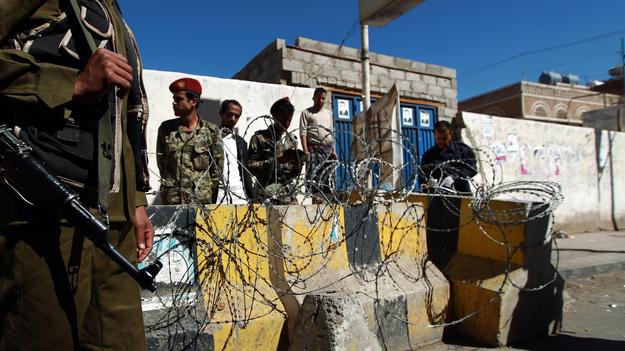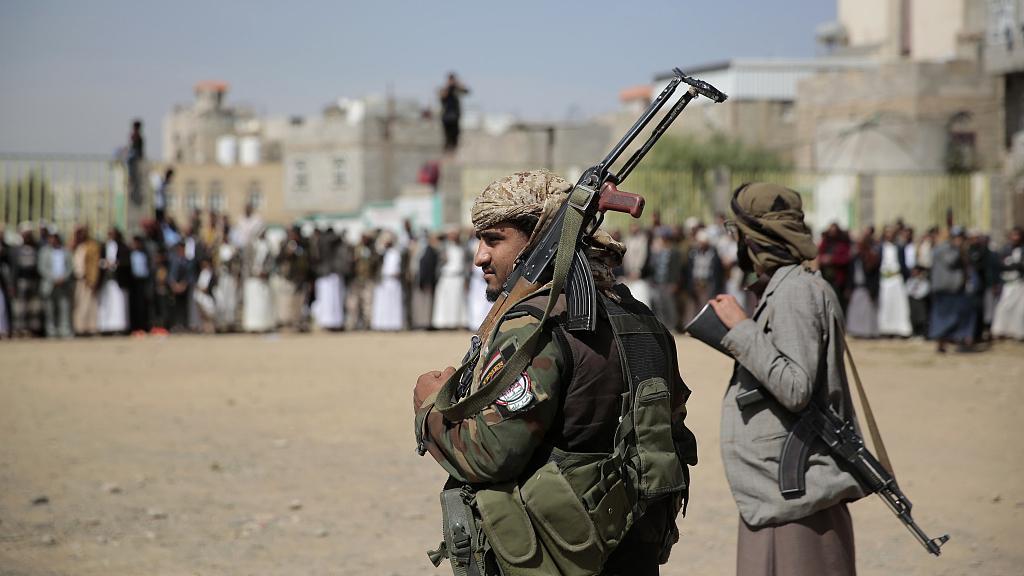Aden, Yemen, March 1, 2022 (Xinhua) The United Nations Security Council considered the Houthis in Yemen a "terrorist group" in a first-of-its-kind move adopted by the council. The group was also included on the sanctions list and with the expansion of the arms embargo on the armed group that controls the capital Sanaa and most of the northern governorates Yemeni.
The official website of the United Nations stated that yesterday (Monday) the UN Security Council adopted Resolution 2624 (2022) under Chapter VII, which provides for the renewal of the sanctions regime on Yemen, and describes the Houthi group - known as Ansar Allah - as a "terrorist group".
The resolution, which was confirmed by 11 countries, included the Houthi group as an entity on the list of sanctions in Yemen under the arms embargo, in addition to condemning the Houthi group's cross-border attacks on civilians and civilian infrastructure in Saudi Arabia and the UAE, and calling on the group to immediately stop hostilities.
The resolution considered that "the continued supply of weapons and components to Yemen is a violation of the targeted arms embargo imposed under paragraph 14 of resolution 2216 (2015) as a serious threat to peace and stability in Yemen and the region."
The UN Security Council issued Resolution (No. 2216) on April 14, 2015 imposing sanctions, including freezing assets and banning travel abroad, against Houthi leader Abdul-Malik al-Houthi, and others on charges of "undermining peace, security and stability" in Yemen.
The decision was also adopted at the time, banning the supply of weapons, equipment and military transportation to Houthi leader Abdul-Malik al-Houthi and leaders of the group and leaders of the former regime in the country.
The UN Security Council resolution issued yesterday (Monday) “urged all Member States to respect and implement their obligations to prevent the supply, sale or transfer, directly or indirectly, of arms and related materiel of all kinds to entities and individuals on the Sanctions List and those acting on their behalf or at the direction of them in Yemen or for their benefit.”
The UN Security Council resolution indicated that "there is no military solution to the current conflict and that the only feasible way forward is through dialogue and reconciliation."
The Yemeni government considered the decision a step in the right path, and a plan to pressure the Houthis to abandon the course of the war.
Yemeni Minister of Information Muammar Al-Eryani said that UN Security Council Resolution No. 2624 (2022), which "categorizes the Houthi militia of Iran as a terrorist group", and condemns its cross-border attacks on civilians and civilian infrastructure in Saudi Arabia and the United Arab Emirates and describes them With “terrorist acts” and listing them as an entity on the sanctions list in light of the arms embargo, it is an important step in the right direction, and an affirmation of the international consensus regarding the Yemeni crisis.
The recognized Yemeni government also considered, in a statement, "that the classification of Houthi militias for the first time as a terrorist group and its inclusion in the Security Council sanctions list comes in response to the widespread violations committed by these militias, including their terrorist attacks against civilians and civilian facilities in Yemen, Saudi Arabia and the State of The United Arab Emirates.
The government emphasized that the decision "limits the military capabilities of this terrorist group and works to stop Iranian support for it, including arms smuggling, which prolongs the war and exacerbates the humanitarian crisis."
The resolution will also "reduce Houthi violations and their threat to the security and safety of international shipping lanes in the Red Sea and Gulf of Aden," according to the government statement.
The Yemeni government affirmed, "The issuance of this decision represents a positive step in order to pressure the Houthi militias to abandon the option of war and return to the path of peace," considering that the only way to reach a just and sustainable peace in Yemen is the peace process led by the United Nations.


For its part, the Houthi group considered that there was double standards, and that the ban was originally imposed on them.
Abdul-Malik al-Ajri, a member of the Houthi negotiating delegation, said on his Twitter account that the decision "forbids what is prohibited in the first place."
Al-Ajri asks, does the Security Council know that Yemen is prohibited from food, medicine and oil until it considers an arms embargo?
The Houthis did not comment on the contents of the UN Security Council resolution, regarding them being considered a "terrorist group".
-- welcome decision --
Saudi Arabia welcomed the decision, and the Saudi Foreign Ministry “expressed its aspiration that the decision would contribute to putting an end to the activities of the terrorist Houthi militia and its supporters, as this would neutralize the danger of these militias, and stop supplying them with missiles, drones, quality weapons and Iranian funds to finance their war effort and to target civilians and economic facilities.” In Saudi Arabia and the UAE, spilling the blood of the Yemeni people, and threatening international navigation and neighboring countries.”
In turn, the United Arab Emirates welcomed the Security Council's adoption of a resolution renewing the sanctions regime on Yemen, classifying the Houthi militia as a "terrorist group", including them in the Yemen sanctions list, and imposing an arms embargo on them.
The Kingdom of Bahrain also welcomed the Security Council's adoption of a resolution designating the Houthi militia as a "terrorist group", including them in the sanctions list, and imposing an arms embargo on them.
In addition, Yemeni President Abd Rabbuh Mansour Hadi reiterated today (Tuesday) the path to a peaceful solution, during his separate meetings with the UN envoy to Yemen and the US envoy to Yemen.
The official news agency, "Saba", which is run by the government, stated that President Hadi received the UN envoy to Yemen, Hans Grundberg, and affirmed his constant keenness towards peace and his options and references that are inescapable to achieve a comprehensive, just and sustainable peace... again providing full support to the UN envoy in this context and facilitating his tasks to reach a comprehensive cease-fire.
President Hadi discussed with the UN envoy the prospects for a peaceful solution to reach a lasting and just peace in Yemen, according to the three references, which are the basis for achieving a just and comprehensive peace that leads to achieving equality among all Yemenis.
Hadi stressed the importance of putting an end to the threats posed by the Houthi militia to the security of the Red Sea and international navigation, pointing out that he was informed of the recent briefing of the UN envoy in the UN Security Council, as well as Security Council Resolution No. 2624, which classified the coup militias as a terrorist group.
In turn, the UN envoy stressed "to work in accordance with the relevant Security Council resolutions through consultations that lead to achieving the just peace that the Yemeni people deserve," according to the official agency.
The Yemeni president also received, today, the US envoy to Yemen, Timothy Linder King, and the latter stressed "the continuation and continuation of coordination in a unified position for the five permanent members of the Security Council to support Yemen and its constitutional legitimacy."
The Houthi group in Yemen controls the capital, Sanaa, and most of the northern Yemeni governorates, and they are waging war against government forces in a number of regions of the country.
The Houthis launch cross-border attacks from time to time, using unmanned drones and ballistic missiles towards Saudi Arabia and the UAE.
